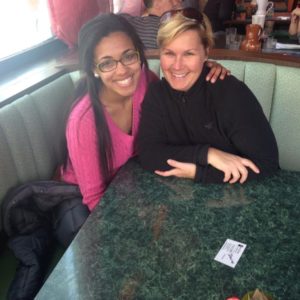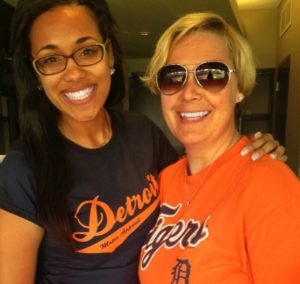Meet Meghan
Hey there! I’m Meghan, a 22-year-old Detroit area native and one of the newest guest bloggers to the Mixed Remixed community. I’m a young biracial woman mixed with African American and Caucasian (German and Irish)—however, I don’t know much about my African American family and/or roots. In fact, I was raised exclusively by my white mother and in an entirely white family.
I wanted to take a unique approach to this concept of feeling disconnected from one side of your biracial ethnicity and delve not only into my internal conflicts and concerns – but also into the experiences of my mother and how she managed raising a biracial child (me) in a solely white environment. Through an interview between my mother and I, one can ultimately see how our relationship shaped the views on my biracial makeup.
Enjoy!
Reflection
As I faced my reflection in the mirror, I studied my caramel complexion and deep chestnut eyes carefully…“Am I adopted?” my eight-year-old self wondered.
At the time, my thoughts didn’t seem irrational. The children at school would tell me I couldn’t be more than one race, and the boxes on the standardized testing didn’t defy that concept. “I had to be adopted,” I confirmed to myself with a slight nod.
I didn’t resemble any of my extended family members—which I definitely found unsettling. However, I was particularly put-off by the lack of resemblance I had to my mom. Being an only child in a single parent family, my mom and I were naturally closer than many children are to their mothers. My mom was all I had and I felt bewildered that we looked nothing alike. She had piercing hazel eyes that illuminated against the light and honey blonde hair that maintained an effortless shine. I carried none of those features.
Still staring at myself intently, I scratched my chocolate curls, confused. At the tender age of eight, I most certainly didn’t believe that even having parents of separate race was feasible.
My father wasn’t brought into conversation very often and in general; my interaction with other races and ethnicities were limited.
Finally, I stepped off the stool that gave me height to the mirror and tucked attempted to tuck quietly below the sink. Instead, its legs scraped and screamed against the cold tile floor—similar to the screaming confusion I heard in my head. “Who am I? And when was I adopted?”
Understanding
Fast-forward 14 years and of course, I’m no longer eight. Instead, I’m a 22-year-old woman who has self-actualized and developed a growing understanding toward her biracial background thanks to the encouragement of my mom.
Throughout the years, I was curious as to how she managed to raise me and if she endured struggles along the way. So, being inquisitive in nature, I decided to sit down and ask her what had been on my mind throughout majority of my life. Here’s what she had to say:
During pregnancy/once you found out you were pregnant, had you ever thought what it would be like to raise a biracial child? Did you initially think there would be any type of struggle in terms of racial identification?
Initially, no. I didn’t think there would be any type of struggle. My main responsibility was raising you and making sure I provided for you. Thinking back, it may have been oblivious for me to think I wouldn’t run into struggles in helping you to identify with your African American side. I also should have been more aware to the potential issues of raising you in a primarily white community where there weren’t many biracial or black children at the time.
Living in a predominantly white community, what would you say some of the hardships were being a white, single parent raising a biracial child?
There were definitely several. Especially once you got to be school aged. A lot of the time, I felt like people would look at me and then look at you and try to figure out what was going on and how we could possibly be related. Regardless, though, I wanted you to know that just because you may have looked different from a lot of the other kids you were in school with – you were beautiful and special. You still are! I really tried to encourage you to love your hair, love your darker skin and recognized that being you is perfectly wonderful. Another issue/hardship I remember was when you were in six. There was an incident when you were in first grade where one of your friends told you, you couldn’t play with them that day because you were black. I spoke with the principal later that day and even again later that week to really enforce teaching racial tolerance at the elementary school. I think back in 2000/2001 racial tolerance was still a very new concept.
What was your reactions to me asking if I was adopted?
It made me sad that you thought you weren’t related to me. At the same time, I could understand where you were coming from. I really wanted to try and find ways for you to embrace your black side. I tried to use words of encouragement and have you watch TV shows with mainly black characters! I also got you a black dolls. But it was still hard being that you were never really surrounded by other African Americans at school, in our family or in the community at large.
Did you ever find yourself to be the subject of any scrutiny while raising me?
Oh my gosh, yes! One of the most notable things I can remember was about your hair. I would be walking down the street with you or in a grocery and African American and/or mixed women would approach me about your hair—saying they could do it for free of charge or at an extremely discounted price if I needed. A lot of the time I would say it was fine but thank you for offering. But in my head I was just like “really?!” I guess I felt inadequate and even insulted that they felt I didn’t know what I was doing when it came to your hair. I initially tried to brush it off but eventually the more I was asked if I knew what I was doing [with your hair], the more I got aggravated.
Were you ever asked if I was your child? If so, how often and how did that make you feel?
Sometimes, yeah. If we’d be in a store together people would sometimes ask if we were together or if I was your daughter. When you were growing up I got it more from the young kids, though. They had trouble understanding why I was light and you were darker.
Overall, what are your thoughts about raising a biracial child and how do you reflect back upon that time?
I’m proud. I’m proud of the woman you’ve become and glad you’ve ultimately come to understand both sides of your race. I wanted you to be well adjusted and very receptive to both sides of your multiracial makeup. It may have come with some unknown territory at the beginning of it all, but I couldn’t be happier.
—Hey there! I’m Meghan, a 22-year-old Detroit native mixed with black and white. I’m a storyteller at heart and have a passion for all things related to multiracial culture, reading, writing, crime thrillers and current events! Feel free to check out my blog, Biracial Beauty and follow me on Instagram @meghandooleyy
Join us for the largest gathering of multiracial and mixed-race families and people in June 2017 for the 4th Annual Mixed Remixed Festival.




positive to hear from another “white mom” and her interracial experiences; I can relate to her story in several ways; thank you for sharing.